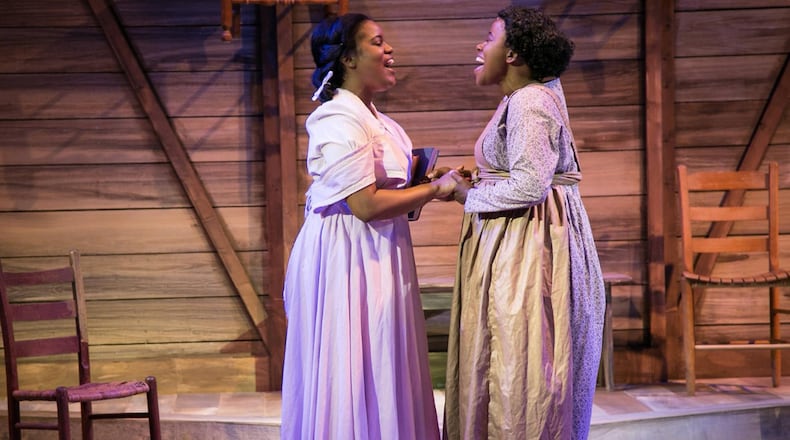“If God ever listened to the prayers of a poor colored woman, the world would be a different place.”
During the early 20th century, when "The Color Purple" takes place, and in 2018 an unfortunate truth remains — to be a poor woman of color in America is to be invisible and subject to suffering. Specifically, black women deal with higher rates of police brutality,40 percent become the victims of domestic violence and more than 20 percent are raped during their lifetimes. And it starts early — black girls face higher suspension rates in school and are more likely to become victims of sex trafficking.
This is perhaps why Alice Walker’s novel about a dejected girl in rural Georgia resonates today. There are still so many girls like the main character Celie — subjectively pretty, sexually abused and cast aside.
These girls almost never get to tell their stories, let alone see them onscreen and onstage. Fortunately, Atlanta audiences have the opportunity to experience the Actor's Express production of "The Color Purple" musical.
Based on Walker’s 1982 book, which is a written as a series of letters to God, “The Color Purple” tells the story of a teenage girl named Celie and her sister Nettie. Used and abused on their father’s farm after their mother’s death, the sisters lean on each other for companionship. However, when Celie’s father sells her to Mister, a widowed sharecropper with a litter of rambunctious kids, the girls are separated. They’re determined to reunite, and the book follows their journey over the course of 40 years, and charts Celie’s course from meek and melancholy to gracious and strong. “The Color Purple,” which was adapted into a film in 1985, shows that love surpasses distance and time.
This show has a long history in Atlanta. The original production was staged at the Alliance Theatre in 2004 and went on to a successful Broadway run two years later. Then, it was revived on Broadway in 2015 — and came to Atlanta's Fox Theatre on a national tour last year — in a stripped-down version that moves the story along more quickly. This iteration of the production is certainly more manageable, but at times, the passage of time is unclear. The original production also allowed for more relationship development between the characters; however, kudos must go to Jeanette Illidge, who plays Nettie, for rendering this character far more significant and sympathetic than I have ever seen.
Latrice Pace, as Celie, delivers a highly effective performance as a woman who has been cast aside, used and abused. Pace comes from a family of gospel music powerhouses — the Anointed Pace Sisters — and her vocals do not disappoint. Her vocal prowess is front and center when she sings “Lily of the Field” and “Miss Celie’s Pants.”
Jasmyne Hinson as the sultry Shug Avery puts her own stamp on the role. Most actresses who play Shug portray her as a woman who shakes and shimmies in the name of sexual freedom, but Hinson goes deeper and reveals a woman who feels as though she has nothing left to give except her body.
Kayce Grogan-Wallace does not disappoint as Harpo’s obstinate and bodacious wife Sophia. (Harpo is Mister’s son.) Three church ladies narrate the action, providing comic relief and cosmic vocals — in short, the women own the show. Kevin Harry (Mister) and Lamont Hill (Harpo) sing to the heavens, but they play their characters a little too much like parodies of themselves and they come off as comic book villains.
All things considered, this production, directed by David Koté, just works. It is an ambitious undertaking in Actor’s Express’ tiny black box theater, but it truly feels like nothing is missing. The set features four chairs hanging on wooden walls on either side of the stage and a platform in the center. Beautiful lighting sweeps the audience and makes the simple set come to life. Choreography and music are tuned to perfection; and costumes by Nyrobi Moss are spot on.
This cast has the audience in the palm of their hand and rightfully so. They strike the right balance between illustrating the struggle of black women to be recognized as fully realized people with humor and empathy. There were a couple of standing ovations before curtain call, and there was never a lull in the action. From the start to finish, this super-talented cast and proficient musicians exceed expectations for a night at the theater full of laughs, tears and answered prayers.
THEATER REVIEW
“The Color Purple”
Through July 29. $21-$45. Actor's Express, 887 W. Marietta St. NW, Suite J-107, Atlanta. 404-607-7469, actors-express.com.
Bottom line: Moving performances fill an intimate space in new production of "The Color Purple."
IN OTHER NEWS:
About the Author
Keep Reading
The Latest
Featured






